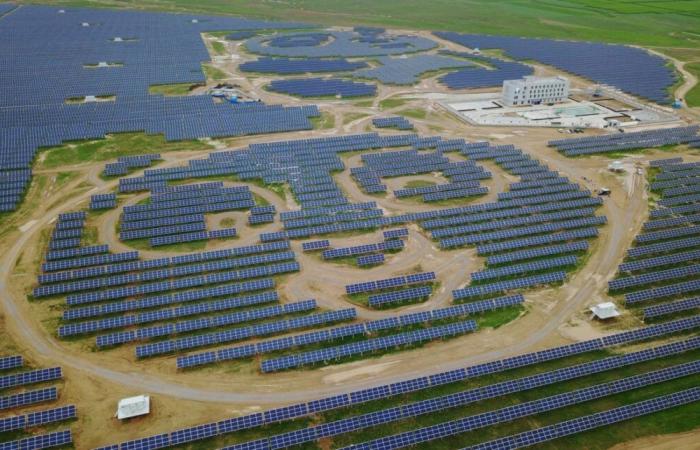China has become a solar energy giant and now dominates every step of the global supply chain. Aerial view of the Datong Panda Power Station in Datong, Shanxi Province of China.
Keystone
European companies are struggling in the face of fierce competition from China’s gigantic photovoltaic industry. Christophe Ballif, Swiss solar energy expert, discusses the significant challenges – and opportunities – posed by Chinese supremacy and explains why Switzerland has a bright future in this area.
This content was published on
December 14, 2024 – 08:00
Christophe BaliffExternal link has dedicated his career for 30 years to research and innovation in the field of solar technology. He directs the photovoltaic laboratory (PVLAB) of the Federal Polytechnic School of Lausanne (EPFL) and the photovoltaic center of CSEM (Swiss Center for Electronics and Microtechnology), both based in Neuchâtel.
swissinfo.ch: Swiss solar panel manufacturer Meyer Burger is one of the few European solar panel manufacturers to have survived market saturation by cheaper Chinese imports. But last month he
announced that its future was uncertain after the withdrawal of its largest client. What do you think of the Meyer Burger crisis? Does the company still have a future?
Christophe Baliff is director of the photovoltaics laboratory at the École Polytechnique Fédérale de Lausanne (EPFL) and the photovoltaics laboratory at the Swiss Center for Electronics and Microtechnology (CSEM).
EPFL
Christophe Ballif: It is clear that they will have to find customers quickly. Otherwise, it will be extremely difficult for them to continue in their current form.
But I really hope they find a solution. Meyer Burger is one of the few Western companies to offer proprietary solar cell technology with excellent performance. It still has valuable intellectual property. New technologies are in preparation there, developed by the group with Swiss partners such as CSEM.
Photovoltaics will probably be the main source of electricity of the century and a major energy source, used massively in the future to produce hydrogen for steel, ammonia and fertilizers, for example. It is therefore necessary to keep part of the technology in Western hands.
But we must admit that the situation is very difficult. In a market like Europe where there are no or few trade barriers against Asian products, no quotas for European products, and where only modest and scattered state aid is put in place – unlike this expected after the announcements made about the EU Net-Zero Industry Act (recently approved European law on net-zero emissions industry) – we cannot fight what happened in China over the last two or three years.
What do you mean by that?
Over the past three years, China has invested around $100 billion (88.5 billion Swiss francs) in the solar module supply chain, just for manufacturing equipment and related buildings. This has led to huge overcapacity; there are too many production lines. In one year, the price of a photovoltaic module has been divided by three.
Chinese industry is very good at reducing costs and adopting the latest elements in its production lines, as it faces competition from other Chinese companies. Their standard products can evolve more quickly: for example, by quickly modifying their production equipment, they can manufacture larger solar cells with slightly higher efficiency. It is very difficult to compete on equal terms.
Gunter Erfurt, the outgoing director of Meyer Burger, accused European politicians of being “too afraid of China” and “not prepared to protect the European solar industry against unfair competition.” Do you agree?
He’s right. Solar energy is a strategic industry. The same goes for batteries or electric cars. These are necessary assets for the energy transition.
Plus

Plus
Swiss solar railway project back on track
This content was published on
21 oct. 2024
The authorities have given the green light to a pilot project aimed at installing removable solar panels on a railway line in the canton of Neuchâtel.
read more Swiss solar railway project back on track
There is a realization that because of China’s considerable investment, the size of its solar industry and its level of automation, it will produce products at a lower cost. But for reasons of resilience, it is necessary to keep at least part of the production in Europe.
We cannot depend 100% on China, especially if we consider the risks of geopolitical conflicts. At least European countries have become aware of this problem, and the Net-Zero Industry Act allows a country to support certain sectors of the industry.
Would you like to receive a selection of our best articles of the week by email every Monday? Our newsletter is made for you.
Isn’t there a positive side to China’s dominance in solar energy?
The positive is that Chinese companies can now manufacture energy assets very cheaply. As they must survive, they quickly become very efficient, learning to reduce material and energy inputs, while increasing performance.
China can now provide the world with all the assets necessary for the energy transition within a reasonable time frame (25-30 years). It has sufficient capacity to supply batteries for the equivalent of 100 million cars per year and batteries useful for network management. It could manufacture 1,500 gigawatts (GW) of solar panels per year. These capacities are 2.5 to 3 times greater than current global demand. And to support its industry, China is massively installing solar and wind power plants, and producing electric cars.
And of course, China needs to export because it has created these gigantic factories. This will push many countries to adopt clean technologies. In a sense, this is rather good news for the planet, and we can trust the Chinese to carry out the energy transition, much more than in the United States or other regions of the world.
You have praised the Swiss solar industry which, according to you, benefits from an interesting industrial structure with Swiss companies doing things “differently and better”. What do you mean exactly?
The industry here is not big. There are a lot of companies that offer what I would call niche or specialty products. No two businesses are the same. It’s always a mix of innovation, unique intellectual property and niche market opportunities.
The successes of Swiss solar innovation, according to Christophe Ballif
INDEOtec offers solar cell processing tools for laboratories;
Stäubli manufactures high quality connectors for photovoltaic modules and systems;
3S Swiss Solar Solutions manufactures photovoltaic modules for buildings;
Freesuns specializes in solar roof tiles;
Solaxess offers special films that can change the appearance of photovoltaic modules;
Climacy combines roof insulation with integrated solar cells;
Solarwall specializes in photovoltaic facades;
Insolight et Voltiris offer agrovoltaic solutions for the agricultural sector;
Studer Innotec supplies power electronics;
Homsphere offers optimized energy systems for buildings and neighborhoods;
LightSeeds manufactures lightweight photovoltaic products from recyclable products.
Is the Swiss solar sector sufficiently supported by the Swiss government and authorities?
The installation of photovoltaic systems in Switzerland has experienced strong growth in recent years. Ideally, the number of new systems installed should be around 2 GW per year in Switzerland. But it is uncertain whether this will continue due to the likely sharp erosion of the minimum reimbursement price of solar electricity.
When it comes to technology and manufacturing, it is clear that Switzerland does not have an industrial policy aimed at supporting solar or clean technology companies. There was a certain level of support for innovation, but it is starting to erode, largely because of the Gaillard plan (a plan of government savings measures involving 3 billion francs, editor’s note).
It’s a real disaster. The Federal Council proposed to halve the pilot and demonstration projects it co-financed. This amounts to 23 million Swiss francs ($26 million) per year. He wants to reduce them to zero, which we find unacceptable.
They also reduce what little funding the Federal Office of Energy had for advanced energy research projects. The program of the Swiss Innovation Agency (Innosuisse), which supports the transfer of technologies from academia to industry, will also probably be reduced. Many companies, associations and engineers are upset, and not just in the solar energy field.
It is very sad that the Swiss government does not seem to realize that it is undertaking efforts that go against the interests of the energy transition, technological development, potential market deployment and the economy of clean technologies . This must be said very clearly. The situation is very unfavorable.
Text proofread and verified by Balz Rigendinger/ts, translated from English by Mary Vakaridis/ptur








